#for context this is during the crucifixion
Text
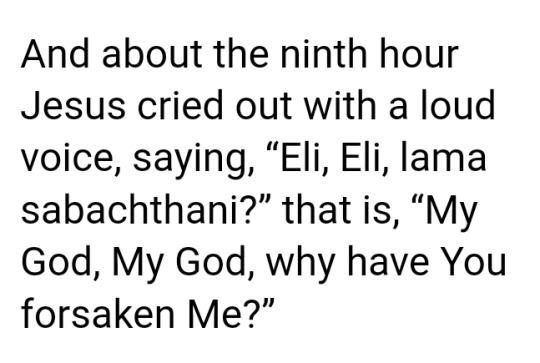
Thinking about this constantly I hope you know
#wolfy religious tedtalks#for context this is during the crucifixion#another fun (not fun) scene is in the garden of gethsemane#when he prays alone#and he begs god to take this cup away from him#but that it was not his will but god's to be done#i go insane i go rabid#i should draw that#did you know he sweated blood
1K notes
·
View notes
Text
What the fuck is Jesus up to in Good Omens season 3?
This is a question I've been thinking long and hard these past couple of days and I have some THOUGHTS SO. Buckle up.
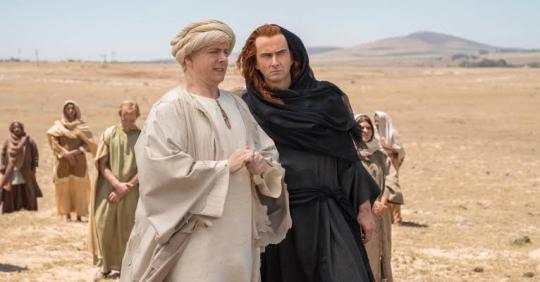
Aziraphale and Crowley watching the Crucifixion (Good Omens, 2019)
First off. The answer to the question posited is relatively simple. What is Jesus up to in GO3? With s2's ending in mind and with the hints we've gotten for 668: Neighbor of the Beast over the years, we know he's descending to Earth to initiate the Second Coming. And that Aziraphale would probably make that happen - or do everything that he can as Supreme Archangel to sabotage it.
But I wanted to examine on how Jesus might fit into Good Omens' overall narratives and established themes - about morality and humanism and free will, and. I'm just saying, there are A LOT of fascinating routes they could do for his character.
(Disclaimer as usual: this is a theory that I obsessed over when I was stuck at the cemetery during All Souls' Day and must be treated as such. In no way am I insisting this should be how canon events must happen. I am just doing this for the funsies.)
The THING about Jesus if you situate him in the world of Good Omens (with the assumption that most of the pop culture Christology mythos associated with him remain intact) is that in this context he very quickly becomes: 1. Adam Young's narrative foil; and 2. an Aziraphale parallel.
Now, the first one is obvious. Of COURSE he is Adam Young's foil, duh. Adam isn't called the ANTICHRIST for nothing. Brought into the world just for the sole purpose of ending it. However, when the time comes for him to fulfill the Will of his Satanic Father, Adam flat out REFUSES.
Both the book and the show attribute this to Adam's human upbringing. He was raised as a human, and because of that he has the trait that the book uses to DEFINE human beings: free will. At the end, Adam had the AGENCY to reject the destiny planned out for him.
'Adam stood smiling at the two of them, a small figure perfectly poised exactly between Heaven and Hell.
Crowley grabbed Aziraphale's arm. "You know what happened?" he hissed excitedly. "He was left alone! He grew up human! He's not Evil Incarnate or Good Incarnate, he's just… a human incarnate—"'
- (Good Omens, 1990)
That is NOT what happened to Jesus.
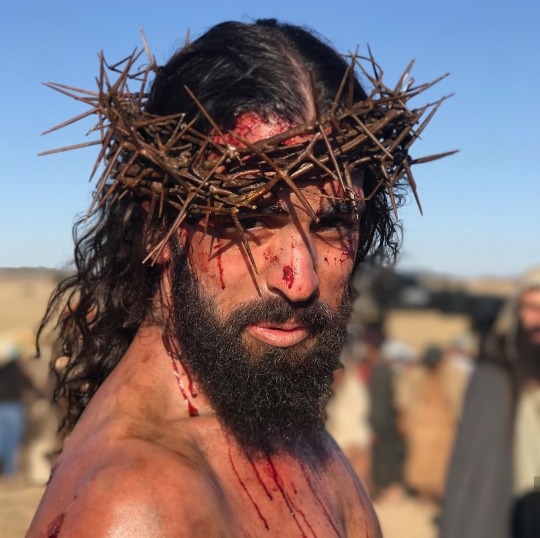
Adam Bond as Jesus in Good Omens (2019)
Like Adam, he was raised as a human -- being a human incarnate was his WHOLE DEAL in Christology. In the beginning was the Word, and the Word was made flesh and dwelt among us... yada yada yada.
UNLIKE, Adam, though, Jesus wasn't able to REJECT his Destiny of Dying Really Horribly and Painfully on the Cross. Narratives in the Bible also made it clear that the Crucifixion was NOT his Will, but that of God's. Like... him begging to be spared from torment but ultimately following God's Will is such an important event entire devotional practices are made out of it.
"39 And he went a little farther, and fell on his face, and prayed, saying, O my Father, if it be possible, let this cup pass from me: nevertheless not as I will, but as thou wilt."
- (Matthew 26: 39, KJV)
We get a glimpse of that in s1ep3 of Good Omens, too:
"JESUS
(muttering through the pain)
Father, please . . . you have to forgive them . . . they don’t know what they are doing . . .
Crowley, in black, comes up next to Aziraphale.
CROWLEY
You’ve come to smirk at the poor bugger, have you?
AZIRAPHALE
Smirk? Me?
CROWLEY
Well, your lot put him on there.
AZIRAPHALE
I am not consulted on policy decisions, Crawley."
- (The Quite Nice and Fairly Accurate Good Omens Script Book, 2018)
SO. Here we have the character of the Christ whose free will and agency had been STRIPPED from him in the guise of a "noble sacrifice." He comes back again on this Earth to fulfill another "inescapable destiny."
Aziraphale and Crowley need to stop him. The solution the Good Omens narrative offers to "inescapable destinies and systems" (both in s1 and s2) is for the character to realize they have the freedom to choose their own fates. It happened with Adam, and it happened with Gabriel, and perhaps it will happen to Jesus.
(At this point my sister frowned and said: "Are you telling me you think Aziraphale and Crowley are going to help Jesus realize he has agency and that him Dying on the Cross for the 'Great Plan' was kinda fucked up actually?" which sounds crazy when you put it like that BUT NEVER SAY NEVER BABIE.)
Because that brings me to my second point: if this all happens, Jesus becomes an AZIRAPHALE parallel.
In the same way Anathema is an Aziraphale parallel and Sergeant Shadwell is an Aziraphale parallel. Here is a character stuck in a suffocating status quo. To save the world, he needs to know he can escape that status quo and decide for himself. In the same way Anathema has to learn how to stop being a descendant or Shadwell to stop being a Witchfinder, or Gabriel to stop being an Archangel, and Adam to stop being an Antichrist, perhaps Jesus has to learn he can stop being... Well, the Christ, as well.
And this, of course, supplements Aziraphale's journey of letting go of the idea of being an idealized vessel of God, so he could finally enjoy the freedom of personhood and choice on Earth, with Crowley.
Or they could turn Jesus into a cackling villain who Aziraphale and Crowley need to kill in season 3, and I'd probably eat that up, too.
#good omens#good omens meta#good omens 2#good omens season 2#good omens spoilers#ineffable husbands#aziracrow#this was such an insane meta post to make but i had to do it#putting my religious trauma to good use iktr#enna rambles
586 notes
·
View notes
Text
Obsessed with this scene and will be forever; A very long meta.
Your ‘exactly’ and my ‘exactly’ are different ‘exactly’s’
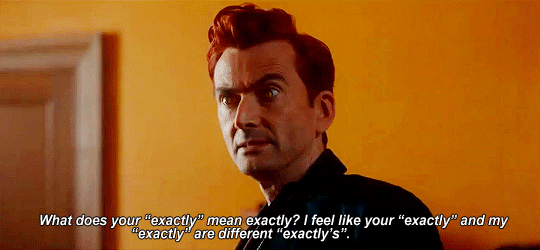
The Scene.
Crowley’s exactly means “We need to be safe and together and away from danger. Let me keep you safe.”
Aziraphale’s exactly means “We need to help because it’s the right thing to do, and we fix things when we’re together.”
Note though, that this is the only time they clarify with each other, and they don’t actually say what they mean, they say what they want to do.
“Let’s drop him off and leave him.” Vs. “Let’s take him in and help him.”
The dissection of this also poses the question, Why does Aziraphale think helping Gabriel is the right thing to do?
And the answer is; Crowley gives him the courage to do what Aziraphale thinks is the right thing and not what heaven decrees is good.
And we can come to this conclusion because Aziraphale for the first time ever, immediately and without hesitation, goes against heaven’s will, without having to be convinced or going through a cycle of indecision or guilt. This is… A. Big. Deal.
Season One.
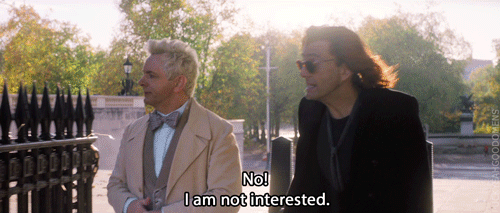
Heaven’s good requires Armageddon to be complete, and under-way. And what does Aziraphale first say about it? “It’s all going to be rather lovely.” “I am not interested[in stopping Armageddon with you].”
Aziraphale loves the earth in this scene. He loves the people on it. He loves all the creatures great and small. He loves Crowley, too. And he still refuses. He needs Crowley to convince him, and even then he still thinks heaven will see sense once he fixes everything. He still believes that right, and good, and holy are the same thing. Even if sometimes he doesn’t agree with it.
Now, let’s go through some history. Between the two of them, for sure, but mainly Aziraphale’s.
An act of defiance; The giving away of a flaming sword. The guilt and worry Aziraphale feels after giving Adam and Eve a chance at survival is not something he gets over quickly. He worries that it was the wrong thing even though it felt right. And the problem isn’t the system that would make doing a good deed the wrong thing, the problem is him. The problem is Aziraphale.
Compliance; The flood. The crucifixion. “God’s a bit tetchy” he says before Mesopotamia is decimated. Aziraphale is clearly uncomfortable with the will of heaven here, but he does not disobey. He does what he is told because the will of God is good and right and correct. He does this same thing with the same reasoning during the Crucifixion of Jesus in 33 AD. Crowley gives us context with a few lines, “Your lot put him up there.” “I showed him all the Kingdoms of the world.” We see a demon who still doesn’t understand why good is so cruel, and knowledge is so evil. And we see an angel that refuses to be conflicted despite his own inherent morality. Because Aziraphale understands why Crowley has questions, he has them too by now. However, Aziraphale has something Crowley didn’t; he has the knowledge of what good intentions and well-meaning questions get an angel.
Doing bad in order to do good. Let’s talk about the Job mini-sode, because let’s be completely real; I’ll never be done talking about the Job mini-sode.

Aziraphale starts this episode thwarting evil. Something he is not conflicted about. You have to thwart evil when you’re good. That’s the whole dance at this point. Crowley stops the dance though, he presents a permit. A permit from a higher authority. Meaning that Crowley, the demon, is performing the will of not only Hell, but also of Heaven. A theme that IS THE WHOLE POINT OF SEASON 1. For all their want of a war, heaven and hell want the exact same thing.
Crowley even states, “The real ‘Big One’ will be between ‘all of them’ and ‘all of us’”. At the end of Season 1 Episode 6.
Aziraphale is horrified by this “permit”. And he goes to check on the validity in heaven, and well. He finds out that it’s real. He doesn’t go higher after that, because he knows you don’t question. He knows he can’t ask why? So he goes to Crowley. If Crowley doesn’t do the evil thing, then Aziraphale doesn’t have to break the rules to thwart it. And well, even though Crowley is a demon, Aziraphale doesn’t actually see him do demonic things all that much. Aziraphale still thinks that Crowley acts like an angel. He’s even starting to think that Crowley is on the side of good. Good being heaven. Crowley denies this, but Aziraphale doesn’t listen. Crowley says, “Kill the blameless Children of Blameless Job” and Aziraphale isn’t going to stop him. The demon has a permit after all. But then something miraculous happens.
A crow, bleats.
Aziraphale looks at a demon defying heaven, defying hell, and doing good. He doesn’t know it yet, but this is his first glimpse of their side. At this point, Aziraphale still thinks Crowley is a little bit on heavens side, because the demon is a little bit good. But then Crowley keeps saving the Children. Crowley stands before angels and he lies to save the children. He does something bad to do something good. And then.
So does Aziraphale.
An angel lies to save children. And then that angel thinks that decision is his undoing. He readies himself for a fall that never comes. Because Crowley is going to keep his secret. This is where Aziraphale once again starts acting with his own moral code. It’s important to remember something important though. Aziraphale still thinks he’s the one who’s wrong. Not heaven. The birth of “their side” coincides with the saving of Job’s children. But there’s a problem.
It doesn’t mean the same thing to each of them. To Crowley it means and end to his loneliness. To Aziraphale it means the beginning of his millennia long struggle of reckoning good with right. Their “exactly’s” don’t match, and they don’t clarify with one another.

The Book and the Bandstand; Aziraphale doesn’t tell Crowley. He doesn’t say, “Let’s go save the world, I found the anti-christ” He says, “Why would I know his shoe-size?” And Crowley doesn’t suspect a thing. Ouch. They disagree on how to continue. Crowley wants to cut their losses and run away. He wants to do this because he thinks they’ve already lost. And Aziraphale doesn’t give him a reason to hold on because despite everything, Aziraphale wants to be good in the heavenly way. He wants to give heaven a chance to do good, too. A higher authority will surely agree with him. And now, he has the courage to ask. Only after he is turned down by heaven does he make his own decision. He steps into ‘their side’ safely, because Crowley had built it that way.
And he saves the world. With Crowley, and the Anti-Christ, and a series of human beings.
Aziraphale retreats to the safety that Crowley has built for them and that he himself has built as well, despite constantly looking over this shoulder. And he finds comfort there. It is the entire reason he finds himself comfortable making his own choices in Season 2, regarding what is good. It’s why he helps Gabriel, and it’s how he gets Crowley to do it too.
You might even say that Aziraphale embraces ‘their side’ more than ever in Season 2. He includes Crowley in all of his plans, excitedly tells him information he finds, calls the bookshop, the Bentley, and their existence, ours. Oppose this directly with Crowley who, in the name of keeping Aziraphale safe, actually just keeps him in the dark(The threat of extreme sanctions, Gabriel’s trial, etc.)

Exactly vs Exactly; AND STILL THE ENDING MAKES SENSE. I have a whole meta HERE about the reason Aziraphale made the decision he did, but I want to talk about it a little bit more. Because it’s the same problem. Their “exactly’s” are different, and neither of them asks the other to explain why.
In this particular case of the ending scene of Season 2, in place of the phrase “exactly” they use the word “together”.
Aziraphale wants Crowley with him in heaven, because they fix things when they’re together. And Aziraphale has faith they they can fix heaven. “We can be together” is how he presents it to Crowley. Crowley rightly sees this as naive, and he’s upset that Aziraphale thinks he wants to be something he’s not anymore.
He finds it hurtful that Aziraphale wants him to change.
“We can go off together” Is what Crowley counters. He says all of this is awful, please let us go off somewhere the danger isn’t. Let me keep you safe. Aziraphale doesn’t want to run away. He wants to save the world again. He wants to save it with Crowley. He wants them both to be good, too.
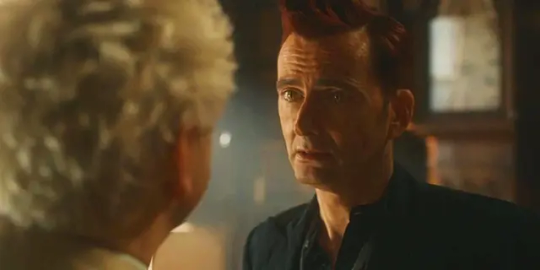
IT’S THE SAME ARGUMENT.
Only Crowley doesn’t let Aziraphale win this time. Aziraphale isn’t right this time. And Crowley isn’t wrong. (I mean I don't think he's right either, they need to find a compromise that isn't the toxicity of heaven and isn't the loneliness of running away.) This time he says, “It’s finally too much, you’re finally asking me to do too much.” Crowley for the first time ever, when asked to make the decision between the two of them, chooses himself. Neither of them explain themselves, and neither of them asks the other to do it either. Because asking questions has always been dangerous for both of them. Anyway, this season makes my brain buzz and I love the ending so much.
#its the “Let me fix it for you” but hearing “Let me fix you for it” dilemma that I said in my Job post#good omens#good omens meta#good omens 2#good omens 2 spoilers#good omens spoilers#go2 spoilers#okay? okay.#but instead its exactly? exactly.#and instead of sweet its actually heartwrenching#I won't stop talking about this EVER
558 notes
·
View notes
Text
Elle Argent as Jesus Christ: Heartstopper art analysis.

Yesterday, I made this post where I wordlessly compared Elle's art piece for the Lambert School to the painting that draws her attention at the Louvre, Caravaggio's Supper at Emmaus, a depiction of Jesus breaking bread for his disciples after his crucifixion and subsequent rising.
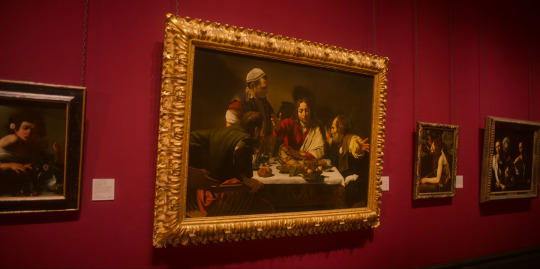
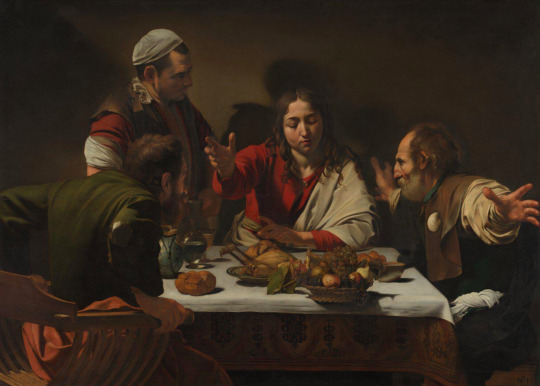
Elle's perspective on the painting / a full view of the painting (source)
The first thing I noticed that helped me draw the connection between these two paintings was their composition, the basic triangular lines that guide the eye in each painting; from Jesus and Elle in the center to the innkeeper and Tao at the top.
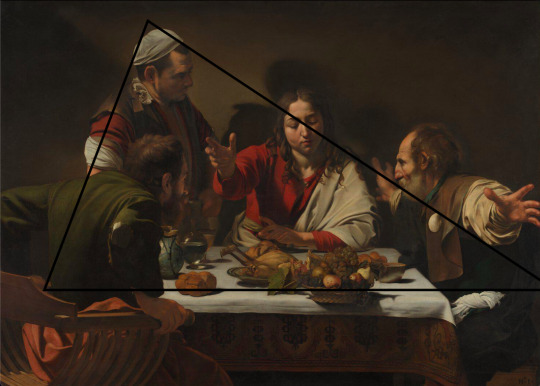

Heartstopper also clearly wanted us to make some connection between Elle and this Caravaggio: they focus on her face before they show us the painting, so we wonder what exactly it is she's seeing, which increases its narrative importance. I assumed she recognized herself in a painting; she did, but not in the way I expected.
The National Gallery (see above source) has this to say about the Caravaggio:
On the third day after the Crucifixion two of Jesus’s disciples were walking to Emmaus when they met the resurrected Christ. They failed to recognise him, but that evening at supper he ‘... took bread, and blessed it, and brake and gave to them. And their eyes were opened, and they knew him; and he vanished out of their sight’ (Luke 24: 30–31).
Painted at the height of Caravaggio’s fame, this is among his most impressive domestic religious pictures. He brilliantly captures the dramatic climax of the story, the moment when the disciples suddenly see what has been in front of them all along. Their actions convey their astonishment: one is about to leap out of his chair while the other throws out his arms in a gesture of disbelief. The stark lighting underlines the dramatic intensity of the scene.
Typically for Caravaggio, he has shown the disciples as ordinary working men, with bearded, lined faces and ragged clothes, in contrast to the youthful beardless Christ, who seems to have come from a different world.
Jesus, in the story, opens the eyes of his disciples in more ways than one (I pulled my Bible out for this!). First, in the scene depicted in the painting, the disciples do not know that this man is Jesus until he blesses the bread and breaks it for them, revealing himself as Christ. Second is the context in which Jesus comes to share dinner with his disciples: they meet him on the road during the day before, and he interprets the Old Testament for them: (stay with me I promise we'll leave the Biblical stuff and get back to the gay stuff soon)
Luke 24:13-16 Now on that same day two of [the disciples] were going to a village called Emmaus, about seven miles from Jerusalem, and talking with each other about all these things that had happened. While they were talking and discussing, Jesus himself came near and went with them, but their eyes were kept from recognizing him.
Luke 24:25-27 Then he said to them, "Oh, how foolish you are, and how slow of heart to believe all that the prophets have declared! Was it not necessary that the Messiah should suffer these things and then enter into his glory?" Then beginning with Moses and all the prophets, he interpreted to them the things about himself in all the scriptures.
If Safe Space is an exact analogue to Supper at Emmaus, then Elle takes the position of Jesus, and she draws from the story of Christ's crucifixion and rising a trans metaphor.
Death does not always mean death. For example, in the world of tarot, the card of Death does not signify literal Death, but a transformation: that the idea of death is a catalyst for change. If you're trans or non-binary, you understand the idea of the person you were being dead; that's why they call it a deadname. For me, the girl I was is dead. The person I am now, a living, breathing, non-binary person, is alive.
Jesus died and lived again; the boy Elle was died and the girl Elle is lived. Elle takes the spot of Jesus. Elle is risen.
There's another half to this metaphor: of the disciples that don't recognize Jesus. See where I'm going with this? At first, after Jesus had undergone his transformation, the disciples do not recognize him; literally "Their eyes were kept from recognizing him." The fault is not on them – it is another stronger force that maintains their blindness. But Jesus stays with them, despite the fact that they don't know who he is, and he talks to them about the scriptures.
We don't know much about Elle, pre-transition. But we know that Elle, Tao, and Charlie, at least, were friends before Elle's transition, and she had to come out to them at some point. So, in essence, she is Jesus on the road to Emmaus; unrecognized, a stranger, until she reveals herself for who she is.
She takes the moment Jesus tells his disciples who he is and shows what happens when Elle stays. We don't all have the luxury of being the Son of God, who can just pop away at a moment's notice after coming back from the dead (which is what he does, in the story: once the disciples have their eyes opened, he leaves). But this is Elle, out, resurrected, staying.
"So. There've been a lot of changes in my life over the last couple years. But with this piece I guess I wanted to capture a place that holds a lot of happy memories. Even in the darker times. Somewhere I always felt safe."
Safe Space comes after the moment of realization, after Elle comes out, after her friends' eyes are opened. But implied in its source and its inspiration is the moment of truth, the moment of coming out. There's been a lot of that, this season, coming out. There's people that want to and are scared, and people that refuse to and walk away. We never had to go on that journey with Elle. But she's telling us about it, now. She's telling us that it was glorious, that it was godly, that it was religious, that she died and was resurrected.
Before I leave, I want to touch on Tao's importance in this piece. The disciples in Supper are the two men that are seated; the man standing is the innkeeper, who is not quite a part of Jesus' world. Interesting, that Charlie and Isaac, the two people of Elle's group who are part of the queer community, take the place of the two disciples, and Tao, the token straight friend, is standing in the place of the innkeeper; not a follower of Jesus but a witness to the miracle of his resurrection anyway. They are all different people in this painting; different identities, different lives, different loves. But they were all there to witness Elle revealing herself in her resurrection. Tao, afraid of being left alone, is brought into this inner sanctum of Elle's world. Into her safe space.
#heartstopper#heartstopper spoilers#heartstopper analysis#heartstopper meta#elle argent#tao xu#charlie spring#isaac henderson#heartstopper season 2#my stuff#i am absolutely in love with this analysis#and i hope that everyone else likes it too!!!#userbarrow#userelletao
243 notes
·
View notes
Text
How to Write Devastating Betrayals (Pt. 1)
Here are some elements + tips on satisfying betrayals that will destroy both your characters AND your readers!
1. Relationship Between Trust and Betrayal
The #1 Betrayal Rule:
MORE TRUST = WORSE BETRAYAL
This is because TRUST implies 2 main things:
The traitor has probably PROVEN their trustworthiness, and now has a shared history + bond with the character they’re betraying
The traitor probably has access to a LOT OF INFORMATION about the character, whether it’s career-wise or personal. Probably at least some information the character considers STRICTLY confidential
An act of betrayal undermines Point 1 by manipulating Point 2 to their advantage.
So, if you want your betrayal to DESTROY, have the traitor be CLOSE with the character they’re about to betray. Lets compare examples:
you are a gang boss. You hire a new recruit who doesn’t really know anything except one insignificant operation, like “today we buy groceries at 2PM”
your recruit tells the rival gang about the grocery trip
→ betrayal doesn’t really matter that much
you probably didn’t place much trust in a new recruit
the implications of information leak are insignificant
→ not much plot weight
On the other hand:
you find out that the entire time, your RIGHT HAND MAN (also your childhood friend!) has been feeding information to the rival gang and sabotaging your operations
→ HURTS a lot more emotionally
might ruin everything you’ve built, career-wise, for good
→ LOTS of plot weight
From a completely SECULAR PLOT STANDPOINT (please don’t come for me, theologians), Judas’ betrayal of Jesus is a good example because:
Judas was one of Jesus’ disciples, a.k.a. the people considered closest to him, and who followed Jesus throughout all of his preaching years
Judas’ information about Jesus’ identity and whereabouts led to Jesus’ crucifixion → LOTS of plot weight (the entire Bible from a Christian standpoint foreshadows this moment, and every point after is spreading word of this moment. Talk about plot implications!)
ONCE AGAIN, I know all the “Jesus knew and allowed it to happen” “it was the will of God” stuff but this is purely used as a good plot example!!!!
2. Reason for Betrayal
“’Cause it’s super edgy/evil/cool” is DEFINITELY not a valid option.
All the plot points in a book build towards achieving a goal, and all the characters do things they think will get them closer to what they want. Likewise, the traitor must want a specific thing that ONLY betrayal can get them, or that betrayal can get them more efficiently.
People generally portray typical traitors as:
completely selfish with no personality trait aside from infinite ambition and ruthless pragmatism
a hero whose had enough
someone who sees the person they betrayed as a “worthless disposable” or something
Traitors don’t have to be morally bankrupt, even though betrayal is typically seen as something inherently bad, or just a bad means to a good end at best.
They can be conflicted about the betrayal (like Macbeth delaying his murder of King Duncan), remorseful about it (like Discord from MLP feeling super guilty after he hands the main protagonists over to the villain), or even do it for the “greater good.”
e.g. Brutus thought Caesar was becoming too power hungry, and would destroy the republic by becoming a dictator, so Brutus betrayed him to preserve the republic
→ example of a betrayal that was NOT self-serving
However, building on the MLP Discord example, a traitor can also have been manipulated into it themselves.
(For context, the villain basically promised Discord lots of power if he handed over the protagonists, but then the villain also sucked away Discord’s powers afterwards—won’t bother explaining MLP magic mechanics LOL)
3. Foreshadow It
A satisfying betrayal is usually a subtle, looming shadow that creeps over your plot before it makes its grand entrance during the scene when the character realizes the traitor sold them out.
A good example is in Shakespeare’s dramatization of Brutus’ betrayal:
Brutus’ loyalty to the REPUBLIC is made super clear throughout. When Caesar starts deviating, seeming more dictatorial, Brutus remains firm.
Their values are CLEARLY conflicting, so SOMETHING has to be done. Either:
they reconcile by both agreeing on either dictatorship or democracy
they turn on each other...and that’s what happens
Basically, planting the possibility in your reader’s mind is a great way to foreshadow a betrayal.
Other ideas could be:
traitor begins suddenly acting a lot warmer to the unsuspecting character, or even colder right BEFORE the betrayal
traitor is always TOO obedient and/or sycophantic
traitor acts suspicious, e.g. caught in lies, using inconsistent body language (ex. pretending to cry when talking about something really bad), caught talking to people they shouldn’t be talking to (e.g. rival gang)
∘₊✧────── ☾☼☽ ──────✧₊∘
instagram: @ grace_should_write
stay tuned for part 2!
Hope this was helpful, and let me know if you have any questions by commenting, re-blogging, or DMing me on IG. Any and all engagement is appreciated <3333
Happy writing, and have a great day!
- grace <3
#writers on tumblr#writing#writing tips#booktok#writer#writeblr#novel#writerslife#writergram#wattpad#betrayal#oc#writing stories#creating characters#characters#fantasy#ya fantasy#ya books#plot holes
280 notes
·
View notes
Text
SONIC POLL RESULTS
Hello people from this poll! This is a breakdown of the poll results with evidence! Please note that this only included events from the games. But before that lemme preface this with I Did Not expect the poll to get *checks notes* 8,639 votes?!!?? I expected like 150 max. So that’s why some response were kinda exaggerated or just straight up wrong because I’m incapable of counting. So here’s the results!
Option 1: Shadow the Hedgehog gets crucified (TRUE from Sonic 06)
Ok so this is what I meant when I said I exaggerated some stuff. No he does not get nailed to a cross. However, he does get put in T-pose jail.
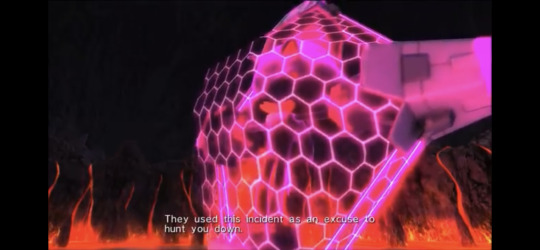
(From here starting at 11:37). Considering the context of being forsaken by humanity after the world ends, and that you can’t really nail a guy to a wooden cross in a fiery wasteland, this is pretty damn close to a crucifixion (cyber crucifixion? It is 200 years in the future). I may have exaggerated but I am prepared to stand by it.
Option 2: Sonic gets thrown into a maximum security prison (TRUE from Sonic Adventure 2)
This was way more known compared to option 1. So during SA2 sonic gets framed for stuff he didn’t do as a coverup and he gets imprisoned on Prison Island

(From here at 6:40)
Option 3: Tails gets turned into a cyborg (TRUE from Sonic Lost World)
I kinda don’t blame people for not knowing this one since this game was kinda boring, Tails gets captured by the villains of this game and they turn him into a robot to fight Sonic. However Tails was able to circumvent their brainwashing and keep his free will.

(From here at 26:21)
Option 4: Knuckles beats the shit out of a ghost (TRUE from Sonic Adventure 2)
This also hails from SA2 as a random one-off boss fight that has nothing to do with the main story. It’s cool as fuck though.

(From here)
Option 5: Sonic gets Isekai’d twice (TRUE from multiple games)
Ok so I fucked up this one. I only counted the Sonic Storybook Games of which there are two (in which sonic is sent to worlds based around the Arabian Nights and Arthurian Legend). However Sonic has been thrown into different dimensions both in Sonic Rush Adventure and Sonic Forces and probably some others I’m forgetting about. That’s honestly my bad BUT I’m technically still right
Option 6: Eggman asks Sonic “How did you get here so quickly?” (TRUE from Sonic Unleashed)
This is probably the best line in the series since Eggman is being completely serious asking this to his arch-nemesis with super speed. Come on dude.

(From here at 20:35)
Option 7: A Frog swallows a Chaos Emerald (TRUE from Sonic Adventure)
Yeah so a cat’s pet frog swallowed a chaos emerald, grew a tail, and got chased around the country by both the cat and Eggman’s robots. Don’t worry the frog and cat were reunited safely in the end.

(From here)
Option 8: Shadow gets possessed by a time god (FALSE)
I found you, faker!
While Shadow has been subject to mind control by an evil alien overlord, been a victim of identity theft by half of a time god (pictured)

and also abducted by a different (or the same?) time god, he has not been possessed and/or controlled by a time god.
And Finally,
Option 9: Amy can turn invisible (TRUE from Sonic 06)
Yes, this is true. It is a one-off ability that is never explained nor brought up again.

(From here at 2:04)
In Conclusion
Go play/watch Sonic 06
#gemz speakz#gemz pollz#polls#sth#shadow the hedgehog#sonic the hedgehog#Amy rose#miles tails prower#knuckles the echidna#dr eggman
157 notes
·
View notes
Note
crassus is the man who lined the via appia with crucified slaves. why did you have to make me like him
alright, so I don't actually make anyone feel one way or another about crassus.
the thing about crassus is that he's unusual even for the unusual era that he lived in, and that makes him compelling. the other thing about crassus is that even though he commits horrific acts of violence, he's not actually behaving worse than any of his other contemporaries. there's a lot of violence happening, and it's all kind of awful. caesar commits a genocide, and he's still the special guy to a lot of historians who probably would say that committing genocide is bad, actually, and you shouldn't do it.
he's not even behaving particularly badly by roman standards, since his crucifixion of the slaves along the via appia falls in line with roman ideals of what type of violence is acceptable, which is it's own kind of upsetting in a broader context of state and imperialist violence.
it's fine to have complicated or contradictory feelings about him, you don't even have to like him to sympathize with aspects of him or his life if you don't want to. you can actively dislike everything he's ever done and find him compelling because he's like, a guy, he did stuff during an interesting period of time, and a lot of it is objectively interesting and weird.
there's something in how rome did not spiral into successive civil wars and with massive body counts while he and pompey held joint power. there is something else in how he was the guy who brought back decimation and came out of it with a morale boost. he loved his sons. he crucified an appalling amount of people who suffered under roman slavery. pompey took credit for it, and somehow that strikes me as it's own repulsive violence.
I like crassus as much as I dislike him! I contain contradictory multitudes. it's fine. so did he. I contain no contradictory multitudes about caesar tho, which is a kind of contradiction as well. get out of the way brutus, I'll stab him myself.
#ask tag#ive wanted spartacus to kill crassus for many MANY more years than ive ever cared abt crassus#like. a whole ass decade. if it weren't for Real Life Events there's a good chance that i would've moved on from crassus to someone else#but alas! he will be here to stay. taking up permanent residence in my brain until i die#lmao its actually funny to think about because the thing that made me fixate on crassus is what made me go. oh Yikes. about cicero#ah! life. what complex and complicated and contradictory fuckery it all is.
51 notes
·
View notes
Note
op could you elaborate on the she/her muriel thing. because i totally get what you mean but i find it so hard to articulate why... its just like. mmmmm. canon they/them character. but you wont respect their prns. but then again i enjoy when people get genderwierd w the ineffable spouses. would you respect my prns if you cant even respect a fictional character. is that the same thing. idk.
hi anon! i'll try best to elaborate, but apologies in advance if it comes off a bit... intense?
to give some context to my words:
i am nonbinary
i am afab
my pronouns are they/them
most everyone with the exception of close friends and people on the internet misgender me with she/her pronouns because they perceive me as a woman.
i think the root of it for me is that muriel has no experience interacting with earth, let alone humans, before they're sent down to be Inspector Constable. and because they have no experience with humans, they most definitely have very little context for the human construct that is gender. muriel's pronouns are they/them because those are the default gender neutral pronouns in english. muriel (like the other angels and demons) is referred to with they/them pronouns because, for all intents and purposes, they don't have gender.
whereas aziraphale and crowley (and even gabriel to a certain extent) have interfaced with humanity enough to have developed some level of understanding regarding gender, and possibly even an understanding of what they want their gender to be/be perceived as.
additionally, crowley and aziraphale play with gender in a way that feels very intentional to me.
crowley has canonically, in the show, presented femme. meta writers far more skilled than me have examined how, during the crucifixion scene, crowley is very obviously dressed more like the women in the background than the men. and it's not just in the historical flashbacks that we see crowley's genderfuckery. his modern look is comprised of a combination of femme and masc pieces. he wears a woman's cut waistcoat and his "11 years ago" look features women's sunglasses. all while inhabiting a decidedly man-shaped body.
i'm also just going to remind the audience that crowley outright denies being "a lad" in season 2. he straight up told us he's not A Dude.
aziraphale's genderfuckery is definitely less obvious and some might say debatable. that being said, i would make the argument that aziraphale's tendency to dress and present in a way that results in him being almost universally perceived as not only A Gay Man, but an effeminate gay man at that, is a quintessential example of gender as performance. and i do believe that aziraphale is making a very conscious and deliberate choice to present as a gay man. for fuck's sake he calls himself THE Southern Pansy, he knows what he's doing.
also, i know it didn't actually happen, but we almost got both of them presenting femme in the 60s so like. there's that too.
so, to me, it's ok to fuck around with crowley and aziraphale's genders in fanfic and art and the like because they do so canonically. the book makes it very clear that they are "man-shaped" but not necessarily men, ie they have chosen bodies that are perceived as being A Gender but that doesn't mean they technically are.
whereas muriel does not. muriel doesn't have a concept of gender because they haven't been on earth or around humans long enough to develop one. they are only ever referred to with gender neutral language. so it just feels really gross to me when people choose to she/her them. because to me it feels like saying "well this body that appears woman-shaped to me must mean they are a woman" which is a sentiment i, unfortunately, know all too well.
muriel is a character that is canonically referred to with they/them pronouns, on a major TV show on a major streaming platform no less. so it really fucking sucks to see people disregard that because they "can't remember to they/them muriel" or because they "seem like they use she/her."
to put it bluntly, every single argument i've ever read in favor of she/her-ing muriel has boiled down to "i just can't be bothered to remember they use they/them" and if you can't use a fictional characters pronouns correctly then i have zero faith you can use a real person's pronouns correctly. all i hear when i read those arguments is "i can't be fucked to do the bare minimum of gendering trans people correctly."
and lastly, i know it's genderfuckery when people she/her aziraphale and crowley because they're "man shaped" in the book and played by male actors in the show. but i don't have much faith that it's genderfuckery when people she/her muriel because i can almost guarentee it happens for no other reason than the fact that Quelin Sepulveda is a woman.
#wow that got long really fast#i hope this provided some amount of insight and wasn't too confusing#asks#my asks#answered asks#good omens#muriel#muriel good omens#kind of good omens meta
34 notes
·
View notes
Text
I just found out that Crowley was presenting as female during the Crucifixion scene and I have never been happier
(for context Crowley was wearing women's clothes in that scene and neil confirmed it)
186 notes
·
View notes
Text
Religious Imagery and Symbolism in Eli Ever:

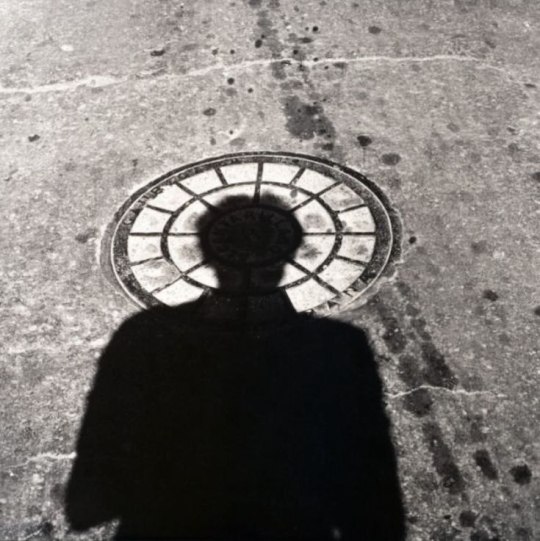
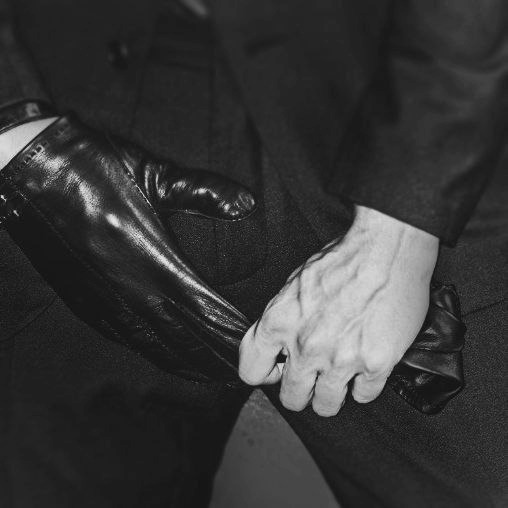
Note : everything in this analysis was or could have been linked in a more generalized and not necessarily true theology, only as a way to try to associate or make connections with the mentioned character.
Baptism
His first death can be likened to a Baptism.
Baptism is a Christian sacrament of initiation and adoption, almost invariably with the use of water. It may be performed by sprinkling or pouring water on the head, or by immersing in water either partially or completely, traditionally three times, once for each person of the Trinity.
" The baptized person emerges from a watery grave into a new life."
Baptism is a symbol of Christ’s burial and resurrection. The entrance into the water during baptism identifies Christians with Christ’s death on the cross, His burial in the tomb and His resurrection from the dead.
The parallel between Eli's first death and baptism is evident. Just as a baptized person emerges from a "water tomb" into a new life, Eli undergoes a transformation after his first death.
"signifies that "you" have died to your old self and sin, emerging as a new creation."
This means that, in the same way, Eli's death represents a passage into a new phase, where he leaves behind his previous "self", emerging as a new creation, almost like a rebirth.
“Going under the water was a burial of your old life; coming up out of it was a resurrection, God raising from the dead as he did Christ." Colossians 2:12-14
Furthermore, there is an evident connection between sin, death, and God's gift of eternal life. As mentioned next.
"For the wages of sin is death; but the gift of God is eternal life through Jesus Christ our Lord." Romans 6:23
Three
The Christian doctrine of the Trinity is the central doctrine concerning the nature of God in most Christian churches, which defines one God existing in three coequal, coeternal, consubstantial divine persons: God the Father, God the Son and God the Holy Spirit.
The Christian Church has celebrated the resurrection of Jesus Christ on a Sunday—three days after remembering his death on Good Friday. This timeline of three days is based on numerous references in the New Testament. Jesus predicted it many times, the three-day timeline matters to the biblical narrative because it is the special day on which God creates new life and activates his covenant with humanity.
three times he shot victor.
three years since they met.
three times he died ( manifesting he coming back and dying again)
" He met his gaze in the mirror and began to unbutton his shirt, exposing the scars from the bullets of Eli’s gun one by one. He ran his fingers over them, touching the three spots where he’d been shot the way a man might cross himself." Part One; Chapter XXVI , Vicious.
In the Bible, we can find more examples of the use of the number three as sacred or a persistent and symbolic repeating pattern, but I only mentioned these few situations that I found relevant or that fit the narrative of 'Vicious'.
Cross
The Cross, is the principal symbol of the Christian religion, recalling the Crucifixion of Jesus Christ and the redeeming benefits of his Passion and death. The cross is thus a sign both of Christ himself and of the faith of Christians. In ceremonial usage, making a sign of the cross may be, according to the context, an act of profession of faith, a prayer, a dedication, or a benediction.
"to outline the form of a cross as a Christian religious act by moving the hand from the forehead to the breast and then from one shoulder to the other, seen as representing the trinity: Father, Son and Holy Spirit."
The use of blood as part of a ritual is laden with symbolism.
"Wouldn’t You?” He cut deeper, through to bone, over and over, until the floor was red. Until he’d given his life to God a hundred times, and a hundred times had it given back. Until the fear and the doubt had all been bled out of him. And then he set the knife aside with shaking hands. Eli dipped his fingertips in the slick of red, crossed himself, and got back to his feet. "Part Two; Chapter IV, Vicious.
In the context of this specific text, Eli blessing himself with his own blood appears to represent a desperate quest for answers and validation from God regarding his identity and the powers he possesses.
This action can be seen as an extreme act of devotion and sacrifice. It may represent the intensity of Eli's search for a divine answer or for God's forgiveness. Making the sign of the cross with his own blood suggests that he is willing to sacrifice or suffer in search of a deeper spiritual connection or proof of divine will.
Blood, Red & White
"And by the law almost all things are made clean with blood, and without blood there is no forgiveness." Hebrews 9:22
In the Old Testament, animal sacrifices were a means of seeking forgiveness and reconciliation with God. The shedding of blood in these rituals symbolized the payment for sins.
The New Testament sees the shedding of Jesus' blood on the cross as the ultimate act of redemption. Christians believe that through His blood, believers are forgiven of their sins and reconciled with God.
And also associated with purification and cleansing.
As we know, Eli associates his murders with a distorted view of divine justice. He believes he is eliminating those people he considers unnatural or threats to society, as a purification, justifying his murders as a way of protecting the world from “villains” with extraordinary powers, this vision can be easily associated, by the way he thinks and acts throughout most of the narrative as a clear link to the Christian view of sacrifice and blood itself.
Red, associated with sacrifices, sin, power, sinfulness. can be conected with redemption and atonement. It represents the idea that through Christ's sacrifice, believers can be cleansed of their sins and find redemption, also linked to martyrdom. Martyrs who died for their faith are often depicted wearing red, symbolizing their willingness to shed their blood for their beliefs.
&
White, purity, innocence, righteousness. Associated with the idea of resurrection and new life in Christ. It signifies the hope of eternal life after death, it can also represents the state of being free from sin.
And for red and white, which are colors normally associated with the character as they continue to be described with him in the narrative or mainly associated with the vision that people have of him, with white clothes, gun and glasses being one of the easiest ways to identify him, we can see that both colors connect with sacrifice, martyrdom, purification and eternal life, which are elements present in the character and his narrative.
Name.
In the Villains series, the name theme remains, whether in a satirical way, a reference to comic books or just a way of demonstrating what a character represents.
Eliot means “The Lord is my God", “Jehovah is my God.”
With the meaning of his name I would like to close this brief summary that I tried to make about the symbolism that I could notice predominantly in the narrative of his character, from his name to the meaning of eternal life and the usual theme, we can see that Eli is a character strongly linked to religiosity and can be easily associated with various concepts of Christianity.



Final Note: Thank you if you read this far and I hope you enjoyed it.
#Eli Ever#Eli Cardale#vicious ve schwab#villains series#eli ever#little analysis#finally did it#vengeful#vicious#v.e schwab
76 notes
·
View notes
Text
so some people (myself included) noticed that one of the lines that the watcher says in the book 3 sneak peek sound suspiciously like a bible verse:
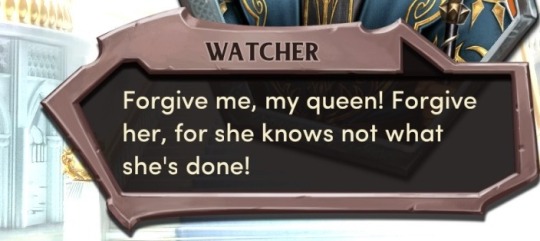
specifically it sounds like luke 23:34 (rsvce):

i think it's interesting that they very much chose to reference bible verses because i see this sneak peek scene as a whole (and the watcher and the old gods) as referencing jesus and god. valax was constantly referred to as the daughter of the ash empress i.e. the mother of grey, an old god. the watcher, being made by the other old gods (most likely nifara), can also then be referred to as their son. in fact, nifara referred to him as "my child" in the sneak peek. he is the son of god, as was jesus in christian theology.
context is also important; luke 23:34 are words jesus said during the crucifixion. in the blades 3 sneak peek, the watcher is going through his own version of this story. he "becomes one again" with nifara (the mother), just as jesus goes to the father and is one with the father, His will made flesh.
tl;dr the bible reference was most likely intentional. yes the watcher is meant to be read as a jesus figure and nifara as God. and im gonna be honest if we made the watcher brunet he kinda looks like jesus anyway.
30 notes
·
View notes
Note
Upon reading the Wikipedia synopsis for the 1997 Don Bluth Anastasia film, and then subsequently the Wiki page for the historical grand duchess Anastasia, I have learnt that the name ‘Anastasia’ is apparently derived from a Greek name meaning “of the resurrection”. And as I know you are a big TLT fan I’m coming to you asking… is this anything? What are the implications? Obviously everyone in the empire is ‘of the resurrection’, but why is Anastasia specifically given this meaningful name?
Fantastic question, and one I’ve been mulling over myself. I think there are two main pieces here, and there are undoubtedly people on here better suited to expounding upon both of them than myself, as both of these topics are beyond the scope of what I can give a super nuanced explanation of, but I’m out here doing my best!
The first is, as you said, in relation to “the resurrection” with roots in “anastasis.” Within the context of Christianity, this is almost always in reference to the Resurrection, that of Jesus. Gideon is the obvious Christ figure of the series, but in NtN, most of our main characters get a little sprinkle of Christ figure imagery at the very least. However, I actually think that the more salient thing here is that within Christian art, the Anastasis specifically refers to depictions of the Harrowing of Hell. Eagle-eyed readers may recall that Harrow herself is named specifically for the Harrowing of Hell. The Harrowing of Hell, in turn, refers to the period of time between Christ’s crucifixion and his Resurrection on the third day. During this period, he descended into Hell and brought salvation to the righteous souls there, leading them out of Hell. I’ll throw in here that the stoma is said by John to be the mouth to Hell. Make of that what you will.
Additionally, I’ll point out that the Church of the Holy Sepulchre is also known as the Church of the Anastasis. This is significant to our Anastasia because the Church of the Holy Sepulchre/Church of the Anastasis includes the site of Jesus’s crucifixion… and his tomb. Which sounds more than a little familiar, no?
So the second big thing is that within biology, “anastasis” has a similar but distinct meaning. Take a look at this quote which I’ve pulled from a journal article not really because of anything about the article itself but because the wording makes the comparison super easy:
Anastasis is a natural cell recovery phenomenon that rescues cells from the brink of death. Programmed cell death such as apoptosis has been traditionally assumed to be an intrinsically irreversible cascade that commits cells to a rapid and massive demolition. Interestingly, recent studies have demonstrated recovery of dying cells even at the late stages generally considered immutable.
Was anyone else immediately reminded of this conversation, in which John asks Harrow to explain apopneumatism (which appears to be a play on apoptosis itself)?
“Thalergetic decay causes cellular death,” you said carefully, pressing the nail in harder, “which emits thanergy. The massive cell death that follows apopneumatism causes a thanergetic cascade, though the first bloom fades and the thanergy stabilises within thirty to sixty seconds.”
Because I sure was.
In this same conversation, they talk about the life force and communal soul of a planet, arising from “the accumulation of microbial life” and what happens when you kill a planet all at once: Resurrection Beasts. Alecto.
Taken together, I think we’re looking at some very significant imagery regarding not just Anastasia, but her relationships to Harrow and Alecto as well. We have a guardian of the Locked Tomb, in which lies the soul of a murdered planet and the ostensible source of necromancy. Given where we saw her last, Anastasia seems to have set some plans in motion to not only halt this death but bring her back. A resurrection, and perhaps salvation for those who have been trapped within the stoma, which is to say: Hell.
#[slurps milkshake through a bendy straw]#apologies for letting this languish in the inbox for so long!#the semester sucked up all my mental energy but now it's replenishing a bit so that i'm able to use it for more fun things :)#thank you for the opportunity to ramble about this!!!!!#ask#poorpoorpitifulme#tlt#tlt meta#anastasia#alecto#nona the ninth spoilers
143 notes
·
View notes
Text
Fyodor's Last Words in Bungou Stray Dogs
Hello! I know I've been saying I was gonna do this for a long time, and I really did try to find my notes quickly, but I'm here now. This post is meant as a Religious Studies Analysis. As such I would like to state that I was a dual major in Religious Studies and History to qualify myself for this discussion.
I am also going to be writing this post for accessibility, that is to say I am going to assume the reader has little to no knowledge about the New Testament so I will be explaining or giving context to a lot of things, even things that may seem obvious.
What Were Fyodor's Words?

Eli, Eli, Lema Sabachtani which as I'm sure you know is the Arameic version of Christ's cry to God as he was on the Cross in the Book of Matthew. The Book of Matthew is one of the four gospels in the New Testament. The Gospels (which translates to Good News) tell the life story of Jesus.
In the King James Version of the Bible these words are said, "And about the ninth hour Jesus cried with a loud voice, saying, Eli, Eli, lama sabachthani? that is to say, My God, my God, why hast thou forsaken me? (Matthew 27:46)
A disclaimer, I am using the King James Version of the Bible for its importance to the English Language. If you want to see Matthew 27:46 translated differently please check Bible Gateway.
The Significance of Matthew 27:46
Let's talk about the context of Matthew 27:46. Now, this line comes during the Crucifixion of Jesus. This was the ninth hour of Jesus being on the cross, or around 3 in the afternoon, and is said following a period of darkness from noon to three.
Now many scholars and theologians have tried to understand why Jesus would have said God had forsaken him, and this is the same for Fyodor too.
However, I would like to talk about Matthew 27:46 in the context of prophecy. Now, for many Christian scholars the Hebrew Bible (Old Testament) contain several prophecies which Jesus later fulfills. In Psalms 22:1 "Eli, Eli, lama sabachthani?" is said once again. Therefore, a popular interpretation of Matthew 27:46 is that Jesus is emphasizing how his death and eventual resurrection were all proclaimed long ago and fated to happen.
In short: the quote illustrates the prophetic nature of Jesus and how he is the Messiah.
And How Does Fyodor Connect?
Well, I believe that Fyodor's last words were a warning. A warning to Dazai that Fyodor knew he would "die" and come back, just as Jesus did when he said it on the cross. Maybe he planned this all out or views his life as some sort of prophecy to eliminate all ability users.
If we take the quote and apply the Psalms connection to it, it becomes evident that the "sacrifice" Fyodor took was fated to happen and he knew it. He knew he was going to come back, he possibly knew this was going to happen.
Moreover, this quote may also have something to do with his resurrection. Later in Matthew (Matthew 27:50-53), Jesus calls out and an earthquake happens, "and the graves were opened; and many bodies of the saints which slept arose." (Matthew 27:52). Right after Jesus calls out to God, the saints rise from the dead and go to heaven. The quote is intimately tied with resurrection, and I don't think that's a coincidence that Fyodor said it and then comes back. I think Asagiri took this into consideration too.
Most people would think that "My God, my God, why have you forsaken me?" would be a plea of a man caught in a trap with no way out. But, this interpretation does not make sense with Fyodor or his "death". Therefore, understanding Matthew 27:46 has both a line connected with the resurrection of saints and prophecy is crucial to understanding why Fyodor said it during the helicopter crash. He knew he was coming back. I think it was a warning and to illustrate how "ordained by God" his mission is. There's probably more context to add, but it's late and I am sleepy now.
I know this all kinda confirms what we already know, but I think it really illustrates the depth of Fyodor's planning and that he might have known how Mersault was going to go the whole time. Which is terrifying if you think about it.
As always feel free to add things, ask questions, etc. If you disagree just keep it civil. There's probably some things manga wise I didn't add so if you have things to add please do.
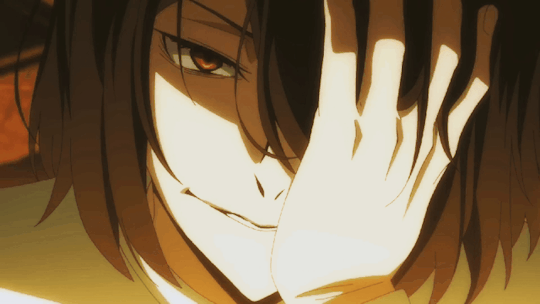
#bsd#bsd theory#bungou stray dogs#bungou stray dogs fyodor#bsd fyodor#bsd manga#bsd analysis#bsd religious studies analysis
10 notes
·
View notes
Text
Wanted to share something interesting I've come across recently while studying the New Testament.
Haven't gotten to John yet, but during the crucifixion narratives of Matthew, Mark, and Luke, there's this neat little detail I noticed. Once Jesus dies, there's this Centurion that gets brought up. In Mark and Matthew, he cries out with: "Truly this was the Son of God!"
"Now when the centurion, and they that were with him, watching Jesus, saw the earthquake, and those things that were done, they feared greatly, saying, Truly this was the Son of God." - Matt 27:54
"And when the centurion, which stood over against him, saw that he so cried out, and gave up the ghost, he said, Truly this man was the Son of God." - Mark 15:39
This is significant because, if I'm remembering correctly, during those two Gospels, pretty much no one acknowledges Jesus as the Son of God. So to have a centurion be the one to acknowledge it at the very end and not a Jew is like. A massive gut punch. It's a really cool effect!
However, when we get to Luke, the centurion says something different:
"Now when the centurion saw what was done, he glorified God, saying, Certainly this was a righteous man." - Luke 23:47
Huh. He says Jesus was a righteous man instead of the Son of God. That's . . . really bizarre, right? This really puzzled me and I couldn't figure out why Luke would've changed the wording here, the phrase that is so important in Matthew and Mark. So, I ended up asking someone who knows a lot about the New Testament about it. Here was his explanation.
Since Luke had spent the entire book addressing and emphasizing Jesus' nature as the Son of God, there was no real need or reason to include the same literary gut punch here. Instead, Luke changed the Centurion's declaration to say Jesus was righteous, which fun fact, when you look at the original word, can also be translated as innocent. It keeps the effect of the gut punch, but changes the context! Jesus was the Son of God and he was completely innocent, yet he was crucified and paid for the sins of the world.
Anyway, just a little something I found cool. :)
6 notes
·
View notes
Text

John 20:19 (NIV). “On the evening of that first day of the week, when the disciples were together, with the doors locked for fear of the Jewish leaders, Jesus came and stood among them and said, “Peace be with you!”
“What does John 20:19 mean?” By BibleRef.com:
“Verse Commentary: When Jesus was arrested, all the disciples ran away (Matthew 26:56). John and Peter followed the arresting mob at a distance (John 18:15), and John was at the foot of the cross when Jesus was executed (John 19:25–27). Other than that, Jesus' closest followers have apparently been in hiding since His capture. John again uses the term "the Jews" in reference to the religious leaders of Jerusalem and their loyal adherents. It would be reasonable for the disciples to assume that if Jesus' enemies could have Him killed, they might well be looking to get rid of His students, as well.
That Jesus appears in a locked room means that His resurrected body is not blocked by physical barriers. John and Peter saw empty grave clothes in the tomb (John 20:6), but the stone was moved aside (John 20:1). That open tomb, it seems, was a sign for Jesus' followers, not a means for His escape. It allowed them to see what had happened but wasn't done "so that" Jesus could come out.
Jesus' comment here echoes what He said during the Last Supper (John 14:27). It's also the sort of thing a person might say in polite greeting. There's a good chance it was also meant to reduce any sense of fear. When these men had seen Jesus walking on water, they were terrified (John 6:19). They were probably startled to see Him appear, alive and well, in a secured room.
Not long before this moment, Mary Magdalene and other women had come to tell the disciples that they had seen Jesus alive (John 20:18; Luke 24:10–11) and were apparently ignored. One can only imagine the vindication she would have felt when learning that they, too, had encountered Him.
Verse Context: John 20:19–23 is the first time Jesus appears to His disciples after being raised from death. They are hiding behind a locked door in fear when Jesus appears to speak with them. Jesus shows physical evidence of His crucifixion, then gives the men a partial measure of the Holy Spirit. This validates the earlier testimony of Mary Magdalene. Thomas is the only disciple not present, and the next passage shows his resistance to believe what has happened.
Chapter Summary: Peter and John get a report from Mary Magdalene that Jesus' body is gone. They arrive to find an open grave, and empty grave clothes, along with a folded face cloth. When the two men leave, Mary remains and suddenly encounters a resurrected Jesus. Though she tells the others, they resist believing until they see Jesus in person. Thomas is especially stubborn, and Jesus remarks on how blessed they are to have been given so much proof. John points out that his writing is meant to prove that Jesus is the Messiah, arranged to encourage those who read to come to faith.
Chapter Context: Most of Jesus' disciples scattered and hid when He was arrested (Matthew 26:56). Only John and some women were present to see His death and burial (John 19:26–30, 41–42; Matthew 27:60–61). When Jesus' tomb is seen empty, there is further confusion. Jesus appears to His followers, proving that He is alive, and remarking that they are blessed to have so much proof. John will complete his account in the next chapter with another encounter and more reminders about the nature of his writing.
Book Summary: The gospel of John was written by the disciple John, decades later than the gospels of Matthew, Mark, and Luke. The author assumes that a reader is already familiar with the content of these other works. So, John presents a different perspective, with a greater emphasis on meaning. John uses seven miracles—which he calls “signs”—in order to prove that Jesus is, in fact, God incarnate. Some of the most well-known verses in all of the Bible are found here. None is more famous than the one-sentence summary of the gospel found in John 3:16.”
#john 20:19#peace#peace from god#peace of god#bibleref.com#bible#christian blog#god#belief in god#faith in god#jesus#belief in jesus#faith in jesus#bible study#christian life#christian living#christian faith#christian inspiration#christian encouragement#christian motivation#christianity#christian quotes#keep the faith#make him known#encouragement#biblequotes
18 notes
·
View notes
Text
bc I’m in the Easter service at church and I’ll have to hear it twice I’ve got time to write up a thing on something i’ve come to realize. The Bible is very female-empowering??? Like??? The needless sexism in some churches come from tradition and internalized prejudice.
In the Bible there is a female deacon (a very important role in the church, kind of like a pastor) who preaches and leads a church.
Taken from acts29.com,
Paul writes at the end of Romans, “I commend to you our sister Phoebe, a servant of the church at Cenchreae . . .” (Rom. 16:1–2). Phoebe is called a servant, a diakonos, which is the same Greek word used for deacon in 1 Timothy 3 and Philippians 1:1.
Christ welcomed women (Mary of Magdalene is the most significant), and during the Crucifixion, ALL the 12 disciples BAILED, too afraid/guilty to show up. But guess who stood at the feet of the cross while he died??? THE WOMEN? (Mary (the mom), her sister, another Mary who was a follower, Mary of Magdalene.)
John 19:25-27 NIV
Near the cross of Jesus stood his mother, his mother’s sister, Mary the wife of Clopas, and Mary Magdalene. When Jesus saw his mother there, and the disciple whom he loved standing nearby, he said to her, “Woman, here is your son,” and to the disciple, “Here is your mother.” From that time on, this disciple took her into his home.”
And at the empty tomb? A group of women went to lay some kind of offering at the entrance and Mary of Magdalene saw the stone moved (WHICH FOR CONTEXT WAS MOST LIKELY SEVERAL TONS AND THIS WAS LIKE 30~ AD) and his body gone (she assumed grave robbing).
John 20:11-15 NIV
Now Mary stood outside the tomb crying. As she wept, she bent over to look into the tomb and saw two angels in white, seated where Jesus’ body had been, one at the head and the other at the foot.
They asked her, “Woman, why are you crying?”
“They have taken my Lord away,” she said, “and I don’t know where they have put him.” At this, she turned around and saw Jesus standing there, but she did not realize that it was Jesus.
He asked her, “Woman, why are you crying? Who is it you are looking for?”
Thinking he was the gardener, she said, “Sir, if you have carried him away, tell me where you have put him, and I will get him.”
Jesus said to her, “Mary.”
She turned toward him and cried out in Aramaic, “Rabboni!” (which means “Teacher”).
Jesus said, “Do not hold on to me, for I have not yet ascended to the Father. Go instead to my brothers and tell them, ‘I am ascending to my Father and your Father, to my God and your God.’”
Mary Magdalene went to the disciples with the news: “I have seen the Lord!” And she told them that he had said these things to her.”
Women have always been portrayed as the more faithful and humble followers in the Bible, and have been shown to have positions in power and influence over a body of Christ? And have been very very highly esteemed in faith?? So that means??? it makes no sense when the church silences and shuns women in the church, besides sexism being the cause? Literally in the Bible it tells us that followers of Christ are made equal, and there is no male, female, old, young, black, white, anything in heaven. Just joy and praise, we are all made one. Like? It just doesn’t make sense, and is one of those things I get angry at people of my own faith for. That’s why so many people hate christans :( some Christians hate them. That’s not Christ’s love? Yeah, some love is tough love in confronting patterns of sin and ungodliness, but it’s not out job to condemn them, just to make them aware and let god choose what happens.
—-
this is also has some great examples :) safe link, quora post.
Also, 1 Tim. 2:21, "I do not permit a woman to teach or to have authority over a man; she must be silent." is in regards to a church where everyone sucks and the women are very uneducated in the Bible and aren’t even in a position to preach. 1# for reading the Bible, READ WITH HISTORICAL AND CULTURAL CONTEXT, AND LIKE HALF THE BIBLE IS POETRY.
#Women in church#christianity#faith#People use god as an excuse to hurt#It’s stupid and I’m sorry for it :(
5 notes
·
View notes